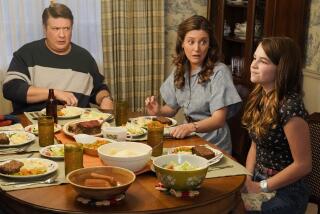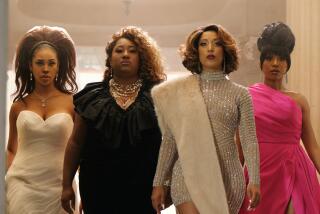KOCE Will Give LaRouche Half an Hour of Equal Time Tonight
- Share via
A half-hour broadcast promoting the independent presidential candidacy of Lyndon H. LaRouche Jr. will be shown tonight at 9:30 on Orange County public TV station KOCE Channel 50 as a result of an equal-time claim made to PBS.
Public TV stations around the country have been running the LaRouche program this week because an earlier Public Broadcasting System documentary--”The Choice,” a 100-minute program profiling George Bush and Michael S. Dukakis--did not include material about LaRouche in supplementary segments dealing with two other independent candidates.
The two 10-minutes segments that followed “The Choice” profiled and interviewed Ron Paul of the Libertarian Party and Leonora B. Fulani of the New Alliance Party.
KOCE broadcast the co-production of Time magazine and PBS’s “Frontline” series Wednesday; most public stations around the country aired the show at 9 p.m. Oct. 24. The reviews and word of mouth were so strong that PBS fed the program to affiliates a second time. WETA in Washington, which produced the show with WGBH in Boston, rebroadcast the documentary at 8 p.m. Saturday.
LaRouche, 66, who is facing federal mail-fraud charges in Virginia and Boston, has alleged that Queen Elizabeth II of Britain is involved in drug trading and holds other extreme views. During the 1970s, he was an active leader of the leftist Progressive Labor Party and the National Caucus of Labor Committees.
LaRouche has run three previous times for the presidency. He and his associates have supported ballot initiatives dealing with acquired immune deficiency syndrome that called for quarantining those with the virus.
The LaRouche program, entitled “The Winter of Our Discontent,” was broadcast Wednesday night on KCET Channel 28 in Los Angeles.
PBS stations around the country were advised Aug. 18 by PBS’s general counsel, Paula Jameson, that “The Choice” might be subject to the Federal Communications Commission’s equal time rules. The advisory estimated that Dukakis and Bush would probably each appear on screen for 15 minutes or less--which would be the amount of time that would have to be offered other candidates on the ballot in at least 10 states.
Jameson wrote that producers of “The Choice” would therefore “undertake production of the additional programming at (the producers’) expense, and PBS will distribute it.” However, local stations might also be required to provide equal time at their own expense to presidential candidates on the ballot in their own states.
As it turned out, Dukakis and Bush were each on screen for 10 minutes in the final cut, which determined the length of the supplementary segments on Paul and Fulani, according to the show’s producer, Sherry Jones.
The FCC’s equal-time political rules have nothing to do with the agency’s Fairness Doctrine, the 38-year-old FCC policy that used to require the nation’s 10,000 commercial radio and TV stations to broadcast diverse opinions on controversial public issues. The fairness requirements were abolished by the FCC on Aug. 4, 1987; such time is now granted strictly at the discretion of individual stations.
“All along there was an awareness of the equal-time requirement,” Jones said. But her understanding was that PBS-affiliate stations would deal with the issue individually, should it arise.
As “The Choice” was nearing completion, “we were watching the ballots in the various states,” said Stephen Atlas, executive producer for public affairs at WGBH in Boston, who was overseeing PBS’s election coverage.
Because the Paul and Fulani campaigns were the only independent candidates to qualify for the ballot in almost every state, Atlas said that “it was an easy choice for us” to include them in the broadcast.
“Both campaigns were very cooperative,” Atlas said, and the segments were produced by PBS affiliate KERA in Dallas.
“Fulani and Paul agreed that would satisfy them,” Jameson, PBS’s general counsel, said about the 10-minute segments.
But after the Oct. 24 national broadcast of “The Choice,” representatives of the LaRouche campaign, which had qualified for the ballot in more than 10 states--not including California--contacted PBS and also demanded equal time.
They were offered an interview with LaRouche as part of a 10-minute segment similar to those covering the Paul and Fulani campaigns, or to provide them with time for their own material.
The LaRouche campaign instead asked that PBS broadcast the 30-minute program produced by his campaign. PBS agreed to feed the broadcast to all its affiliates on Tuesday. The same program had appeared as a paid political broadcast Oct. 31 on NBC. The 10:30 p.m. time slot required the network to start the miniseries “Favorite Son” a half-hour earlier.
On Tuesday, officials at KOCE were unsure whether they were obligated to carry the LaRouche broadcast. Early in the day, based on an Oct. 28 advisory from Jameson, they had placed it on the schedule.
Another advisory from Jameson, marked “urgent,” explained that discussions with the FCC suggested that, by feeding the LaRouche broadcast to all affiliates later that night, PBS would have discharged its obligations under the equal-time rule.
Thereafter, Jameson continued, “each station’s obligation to broadcast the program does not arise until that station receives a request directly from the candidate.”
After receipt of that advisory, the station’s senior management decided not to run the program. But within minutes, the station received a formal telephone request from Jim Duree, a spokesman for the LaRouche campaign in Pasadena. The LaRouche program went back on the KOCE schedule.
“We will air the program,” said Bill Furniss, president of KOCE, adding, “we are only satisfying a regulatory requirement.”
Duree did not return repeated calls from The Times.
More to Read
Get the L.A. Times Politics newsletter
Deeply reported insights into legislation, politics and policy from Sacramento, Washington and beyond. In your inbox twice per week.
You may occasionally receive promotional content from the Los Angeles Times.










